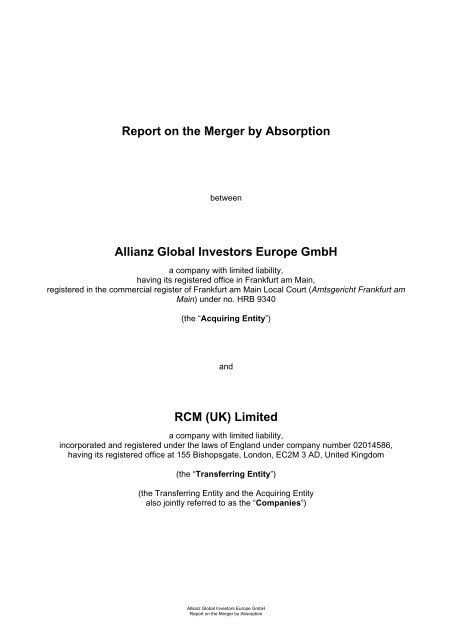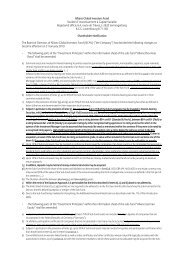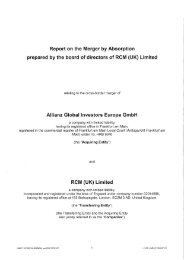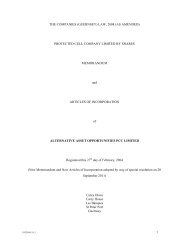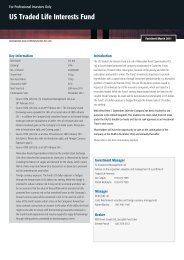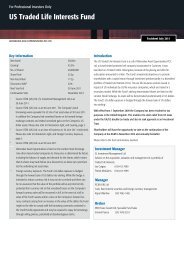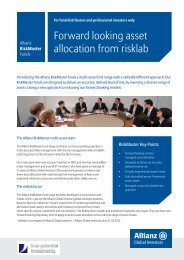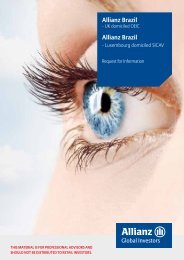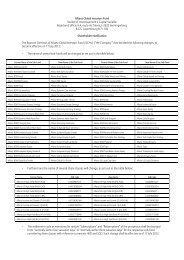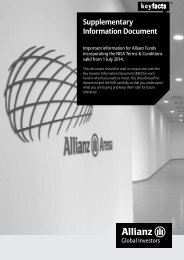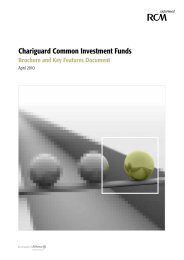RCM (UK) Ltd Acquiring Company Merger Report - Allianz Global ...
RCM (UK) Ltd Acquiring Company Merger Report - Allianz Global ...
RCM (UK) Ltd Acquiring Company Merger Report - Allianz Global ...
Create successful ePaper yourself
Turn your PDF publications into a flip-book with our unique Google optimized e-Paper software.
<strong>Report</strong> on the <strong>Merger</strong> by Absorption<br />
between<br />
<strong>Allianz</strong> <strong>Global</strong> Investors Europe GmbH<br />
a company with limited liability,<br />
having its registered office in Frankfurt am Main,<br />
registered in the commercial register of Frankfurt am Main Local Court (Amtsgericht Frankfurt am<br />
Main) under no. HRB 9340<br />
(the “<strong>Acquiring</strong> Entity”)<br />
and<br />
<strong>RCM</strong> (<strong>UK</strong>) Limited<br />
a company with limited liability,<br />
incorporated and registered under the laws of England under company number 02014586,<br />
having its registered office at 155 Bishopsgate, London, EC2M 3 AD, United Kingdom<br />
(the “Transferring Entity”)<br />
(the Transferring Entity and the <strong>Acquiring</strong> Entity<br />
also jointly referred to as the “Companies”)<br />
<strong>Allianz</strong> <strong>Global</strong> Investors Europe GmbH<br />
<strong>Report</strong> on the <strong>Merger</strong> by Absorption
Contents<br />
I. Introduction ................................................................................................................................ 3<br />
1. Overview of the merger and main steps .............................................................. 3<br />
2. Legal basis and applicable law ............................................................................ 4<br />
II. Description of the Companies ................................................................................................. 6<br />
1. <strong>Allianz</strong> <strong>Global</strong> Investors Europe GmbH ............................................................... 6<br />
1.1 <strong>Company</strong> object ....................................................................................................... 6<br />
1.2 Governing bodies ..................................................................................................... 8<br />
1.3 Employees and co-determination ............................................................................ 8<br />
1.4 Capital and shareholders ......................................................................................... 9<br />
2. <strong>RCM</strong> (<strong>UK</strong>) Limited .................................................................................................. 9<br />
2.1 <strong>Company</strong> object ....................................................................................................... 9<br />
2.2 Employees and co-determination .......................................................................... 10<br />
2.3 Capital and shareholders ....................................................................................... 10<br />
III. Economic grounds for the merger ....................................................................................... 11<br />
IV. Repercussions of the cross-border merger on creditors .................................................. 12<br />
1. General consequences ....................................................................................... 12<br />
2. Repercussions on the Transferring Entity’s creditors ..................................... 12<br />
3. Repercussions on the <strong>Acquiring</strong> Entity’s creditors ......................................... 12<br />
4. Investor protection .............................................................................................. 13<br />
V. Repercussions of the cross-border merger on employees and other personnel ............ 14<br />
1. Transferring Entity ............................................................................................... 14<br />
2. <strong>Acquiring</strong> entity ................................................................................................... 14<br />
3. Procedures for establishing co-determination ................................................. 15<br />
3.1 Applicability of the German Act on Co-Determination of Employees in crossborder<br />
<strong>Merger</strong>s (MgVG)......................................................................................... 15<br />
3.2 Organisation of the employee participation process .............................................. 16<br />
3.3 Application of the Fall-back Solution ...................................................................... 17<br />
VI. Explanation of the merger plan ............................................................................................ 19<br />
1. Effectiveness of the merger ................................................................................ 19<br />
2. <strong>Merger</strong> Date .......................................................................................................... 19<br />
3. Transfer of shares ............................................................................................... 20<br />
4. Articles of the <strong>Acquiring</strong> Entity .......................................................................... 20<br />
5. No merger audit and no special advantages .................................................... 21<br />
6. Miscellaneous ...................................................................................................... 21<br />
6.1 Costs ...................................................................................................................... 21<br />
6.2 No approval required ............................................................................................. 21<br />
<strong>Allianz</strong> <strong>Global</strong> Investors Europe GmbH<br />
<strong>Report</strong> on the <strong>Merger</strong> by Absorption<br />
2
I.<br />
Introduction<br />
1. Overview of the merger and main steps<br />
It is anticipated that the representative bodies of the Companies involved will conclude the<br />
merger plan between the Transferring Entity and the <strong>Acquiring</strong> Entity drawn up by them on<br />
14 June 2013 on 09 September 2013. On the same day, the sole shareholder of the Transferring<br />
<strong>Company</strong> and the <strong>Acquiring</strong> <strong>Company</strong> will resolve and consent to the merger plan.<br />
The following merger report is given in order to inform the sole shareholder, the <strong>Acquiring</strong><br />
Entity’s works council at the Frankfurt am Main site, the <strong>Acquiring</strong> Entity’s employees at the<br />
Munich and Stuttgart sites and, by way of precaution, the group works council constituted<br />
within the <strong>Allianz</strong> group pursuant to section 122e German Restructuring Act (Umwandlungsgesetz<br />
– UmwG) (the “Restructuring Act”).<br />
The present report was prepared by the management of the <strong>Acquiring</strong> Entity in order to describe<br />
the planned merger between the Companies and to outline the repercussions of the<br />
cross-border merger for the creditors and employees.<br />
This report will be made available to the shareholder of the <strong>Acquiring</strong> Entity, the works<br />
council of the <strong>Acquiring</strong> Entity at the Frankfurt am Main site and the employees of the <strong>Acquiring</strong><br />
Entity at the Munich and Stuttgart sites and, by way of precaution, the group works<br />
council constituted within the <strong>Allianz</strong> group no later than one month before the date on<br />
which the shareholder resolves in favour of the present merger.<br />
The Transferring Entity will prepare a separate report governed by English law.<br />
Under English law the shareholder’s meeting of the Transferring Entity has to give its final<br />
consent to the merger. Under sections 122a, 13 and 50 Restructuring Act, the shareholder’s<br />
meeting of the <strong>Acquiring</strong> Entity is required to pass a resolution in favour of the merger<br />
plan.<br />
The merger only becomes effective once it is entered in the commercial register of the <strong>Acquiring</strong><br />
Entity. The target date for this entry is currently 31 October 2013. Irrespective of<br />
<strong>Allianz</strong> <strong>Global</strong> Investors Europe GmbH<br />
<strong>Report</strong> on the <strong>Merger</strong> by Absorption<br />
3
this, the economic effect of the merger will come into force with retrospective effect on 01<br />
January 2013, referred to as the “<strong>Merger</strong> Date”.<br />
2. Legal basis and applicable law<br />
The present merger plan is explicitly subject to English and German law in the light of Directive<br />
2005/56/EC of the European Parliament and of the Council of 26 October 2005 on<br />
cross-border mergers of limited liability companies (the “Directive”). This reason for this is<br />
that the Transferring Entity is a company governed by English law and the <strong>Acquiring</strong> Entity<br />
is a company governed by German law and a so-called “cross-border” merger under the<br />
terms of the Directive is therefore involved.<br />
The Directive was implemented in the United Kingdom by adoption of the Companies<br />
(Cross-Border <strong>Merger</strong>s) Regulations 2007 (the “English Regulations”). In Germany, the<br />
Directive was implemented by incorporating the relevant rules into the Restructuring Act.<br />
The cross-border merger by absorption in Germany is primarily based on the concrete<br />
terms of sections 2 ff., 46 ff. and 122a ff. Restructuring Act.<br />
In legal terms, the planned concentration is a merger by absorption of the Transferring Entity<br />
by the <strong>Acquiring</strong> Entity entailing the transfer of the entire assets of the Transferring Entity<br />
to the <strong>Acquiring</strong> Entity by way of universal succession (Gesamtrechtsnachfolge), without<br />
any liquidation, and absorption of the Transferring Entity into the <strong>Acquiring</strong> Entity.<br />
English law applies to the internal organisation, operational procedures and powers of attorney<br />
of the governing bodies of the Transferring Entity. German law applies to the internal<br />
organisation, operational procedures and powers of attorney of the <strong>Acquiring</strong> Entity.<br />
According to article 14 of the Directive and sections 122a ff. and 20 Restructuring Act,<br />
German law acknowledges that the Transferring Entity ceases to exist as a result of realisation<br />
of the merger and that its entire asset and liabilities including all rights and duties pass<br />
to the <strong>Acquiring</strong> Entity by way of universal succession. The <strong>Acquiring</strong> Entity will keep its<br />
current company form, firm name and registered office as stated in the preamble to this report.<br />
The <strong>Company</strong>’s object is regulated by the German Investment Act (Investmentgesetz –<br />
InvG) (the “Investment Act”) until 22 July 2013. From 22 July 2013 onwards, the Invest-<br />
<strong>Allianz</strong> <strong>Global</strong> Investors Europe GmbH<br />
<strong>Report</strong> on the <strong>Merger</strong> by Absorption<br />
4
ment Act will be replaced by the German Capital Investment Code (Kapitalanlagesetzbuch<br />
– KAGB) (the “Capital Investment Code”) (see Act on the implementation of alternative investment<br />
fund managers (AIFM-Umsetzungsgesetz – AIFM-UmsG)).<br />
According to the transitional provisions of the Capital Investment Code, the Investment Act<br />
will still be applicable after 22 July 2013 until the <strong>Company</strong> has lodged an application as an<br />
AIF asset management company. Therefore, when referring to the Investment Act, respective<br />
provisions of the Capital Investment Code will also be mentioned.<br />
The <strong>Company</strong>’s activities will be regulated by the German Investment Act (Investmentgesetz<br />
– InvG) (the “Investment Act”) until 22 July 2013. From 22 July 2013 the Investment<br />
Act will be replaced by the Capital Investment Code (Kapitalanlagesetzbuch – KAGB) (the<br />
“Capital Investment Code”) (see the German Act implementing Directive 2011/61/EU on<br />
Alternative Investment Fund Managers (AIFM-Umsetzungsgesetz – AIFM-UmsG)).<br />
Under the transitional rules in the Capital Investment Code, the Investment Act also applies<br />
to the <strong>Company</strong> after 22 July 2013 until the <strong>Company</strong> has filed an application for authorisation<br />
as an AIF asset management company (Kapitalverwaltungsgesellschaft). Thus in references<br />
to the Investment Act, the corresponding provisions in the Capital Investment Code<br />
will also be referred to alternatively.<br />
<strong>Allianz</strong> <strong>Global</strong> Investors Europe GmbH<br />
<strong>Report</strong> on the <strong>Merger</strong> by Absorption<br />
5
II.<br />
Description of the Companies<br />
1. <strong>Allianz</strong> <strong>Global</strong> Investors Europe GmbH<br />
1.1 <strong>Company</strong> object<br />
The object of the <strong>Acquiring</strong> Entity is:<br />
(1) The company is an investment company (Kapitalanlagegesellschaft) under the<br />
terms of the Investment Act (or alternatively a management company (Verwaltungsgesellschaft)<br />
under the terms of the Capital Investment Code). Its object is to manage:<br />
a) UCITS-compliant funds (richtlinienkonforme Sondervermögen) according to<br />
sections 46 to 65 Investment Act (or alternatively investment funds under the<br />
UCITS Directive according to sections 192 to 213 Capital Investment Code),<br />
b) mixed funds (gemischte Sondervermögen) according to sections 83 to 86<br />
Investment Act (or alternatively mixed investment funds according to sections<br />
218 to 219 Capital Investment Code),<br />
c) old-age pension funds (Altersvorsorge-Sondervermögen) according to sections<br />
87 to 90 Investment Act,<br />
d) other funds (sonstigen Sondervermögen) according to sections 90g to 90k<br />
Investment Act (or alternatively other investment funds according to sections<br />
220 to 224 Capital Investment Code),<br />
e) special funds (Spezial-Sondervermögen) according to sections 91 to 95 Investment<br />
Act (or alternatively open-ended domestic special AIFs (offene<br />
inländische Spezial-AIF) according to sections 278 to 284 Capital Investment<br />
Code) if assets as defined in section 2(4) no. 1, 2, 3, 4, 7 and 9 Investment<br />
Act are exclusively acquired on behalf of these funds (or alternatively<br />
if assets as defined in section 284(2) no. 2a, 2b, 2c, 2d, 2g and 2i Capital<br />
Investment Code are exclusively acquired on behalf of the open-ended<br />
domestic special AIFs with fixed investment terms) and provided that they<br />
are not special funds in the form of funds with additional risks (Sondervermögen<br />
mit zusätzlichen Risiken) or in the form of funds-of-funds with addi-<br />
<strong>Allianz</strong> <strong>Global</strong> Investors Europe GmbH<br />
<strong>Report</strong> on the <strong>Merger</strong> by Absorption<br />
6
tional risks (Dachsondervermögen mit zusätzlichen Risiken) (or alternatively<br />
open-ended domestic special AIFs in the form of hedge funds under the<br />
terms of section 283 Capital Investment Code and fund-of-fund hedge funds<br />
(Dach-Hedgefonds) under the terms of section 225 Capital Investment<br />
Code),<br />
f) investment stock corporations with third-party managers (fremdverwaltete<br />
Investmentaktiengesellschaften) under the terms of section 96(4) Investment<br />
Act (or alternatively investment stock corporations with variable capital (Investmentaktiengesellschaft<br />
mit veränderlichem Kapital) under the terms of<br />
section 112(1) Capital Investment Code), where investment assets as defined<br />
in a), b), d) and e) involved.<br />
(2) Apart from the business referred to in (1) above, the company may also carry on the<br />
following businesses and activities which are necessary for the investment of its<br />
own assets:<br />
a) discretionary management of assets invested in financial instruments as defined<br />
in section 1(1)1 of the German Banking Act (Kreditwesengesetz –<br />
KWG) on behalf of others (individual asset management),<br />
b) investment advice,<br />
c) custody and management of shares issued under the provisions of the Investment<br />
Act (or alternatively Capital Investment Code) or by a foreign investment<br />
company (or alternatively management company) on behalf of<br />
others,<br />
d) distribution of shares that are issued under the provisions of the Investment<br />
Act (or alternatively Capital Investment Code) or that may be publicly distributed<br />
under sections 130 to 140 of the Investment Act (or alternatively sections<br />
293-335 of the Capital Investment Code),<br />
e) conclusion of pension agreements according to section 1(1) of the German<br />
Pension Provision Agreements Certification Act (Altersvorsorgeverträge-<br />
Zertifizierungsgesetz – AltZertG) and agreements for establishment of a<br />
funded retirement pension (kapitalgedeckte Altersversorgung) under the<br />
terms of section 10(1) no. 2b of the German Income Tax Act (Einkommensteuergesetz<br />
– EStG),<br />
<strong>Allianz</strong> <strong>Global</strong> Investors Europe GmbH<br />
<strong>Report</strong> on the <strong>Merger</strong> by Absorption<br />
7
f) granting of undertakings to investors that upon redemption of shares, termination<br />
of management of shares under the terms of a) and termination of<br />
custody and management of shares under the terms of c) at least a specified<br />
or specifiable amount will be paid to the investors (minimum payment commitment),<br />
and<br />
g) other activities directly associated with the business and activities referred to<br />
above.<br />
1.2 Governing bodies<br />
The governing bodies of the <strong>Acquiring</strong> Entity are the management, co-determined supervisory<br />
board (Aufsichtsrat) and the shareholder’s meeting. The <strong>Acquiring</strong> Entity’s governing<br />
bodies will continue to exist following the merger.<br />
1.3 Employees and co-determination<br />
The <strong>Acquiring</strong> Entity has sites in Frankfurt am Main, Munich and Stuttgart and has 1121<br />
employees as at the effective date 14 June 2013. The employees’ interests at the Frankfurt<br />
am Main site are represented by the works council constituted at this site of the <strong>Acquiring</strong><br />
Entity. The <strong>Acquiring</strong> Entity has an economic committee. The employees’ material rights<br />
are contained in their individual employment agreements (including any individually agreed<br />
inclusions/references to collective wage agreements under labour law) and for the employees<br />
at the Frankfurt am Main site in existing company agreements.<br />
The Transferring Entity is not a member of any employers’ associations and there is no obligation<br />
to pay wages according to a collective bargaining agreement pursuant to section 3<br />
German Collective Wage Agreement Act (Tarifvertragsgesetz – TVG).<br />
The <strong>Acquiring</strong> Entity has a supervisory board in accordance with the provisions of section<br />
6(2) Investment Act and section 1(1) no. 3 German One-Third Participation Act (Drittelbeteiligungsgesetz<br />
– DrittelbG); co-determination takes place according to the One-Third<br />
Participation Act. In concrete terms this means that two of the current six members of the<br />
supervisory board are chosen by the employees.<br />
<strong>Allianz</strong> <strong>Global</strong> Investors Europe GmbH<br />
<strong>Report</strong> on the <strong>Merger</strong> by Absorption<br />
8
1.4 Capital and shareholders<br />
The company’s share capital currently amounts to EUR 49,900,500.00 and is divided up into<br />
the following shares:<br />
a) share with serial no. 1, with a nominal amount of EUR 37,000,000.00 and<br />
b) shares with serial no. 2 to 6, with a nominal amount of EUR 100.00 each,<br />
c) share with serial no. 7, with a nominal amount of EUR 12,900,000.00.<br />
All shares are held by <strong>Allianz</strong> <strong>Global</strong> Investors GmbH.<br />
All shares in the share capital of the <strong>Acquiring</strong> Entity are fully paid up, no repayments of<br />
capital contributions have been made, none of the shares referred to is encumbered with a<br />
right of lien or usufruct, and none of the shares referred to is subject to confiscation or attachment.<br />
The <strong>Acquiring</strong> Entity has not issued any corporate bonds (including convertible<br />
bonds).<br />
2. <strong>RCM</strong> (<strong>UK</strong>) Limited<br />
2.1 <strong>Company</strong> object<br />
The Transferring Entity is authorised to carry on the following activities:<br />
(1) [German translation] Advising on investments (except on Pension Transfers and<br />
Pension Opt Outs);<br />
(2) [German translation] Agreeing to carry on a regulated activity;<br />
(3) [German translation] Arranging (bringing about) deals in investments;<br />
(4) [German translation] Arranging safeguarding and administration of assets;<br />
(5) [German translation] Dealing in investments as agent;<br />
(6) [German translation] Making arrangements with a view to transactions in investments;<br />
(7) [German translation] Managing investments;<br />
(8) [German translation] Safeguarding and administration of assets (without arranging).<br />
<strong>Allianz</strong> <strong>Global</strong> Investors Europe GmbH<br />
<strong>Report</strong> on the <strong>Merger</strong> by Absorption<br />
9
The company may perform any acts necessary to pursue the company object.<br />
2.2 Employees and co-determination<br />
The Transferring Entity has 46 employees at the effective date 14 June 2013. The employees’<br />
rights and duties are contained in their individual employment agreements and, where<br />
relevant, any applicable collective labour law rules. There is no committee comparable to a<br />
German works council or any other body representing employees at the Transferring Entity.<br />
2.3 Capital and shareholders<br />
The Transferring Entity’s share capital amounts to GBP 20,000,000.00 and is divided into<br />
20,000,000 shares of GBP 1.00 per share.<br />
All shares are held by <strong>Allianz</strong> <strong>Global</strong> Investors GmbH.<br />
All shares in the Transferring Entity’s share capital are fully paid up, no repayments of capital<br />
contributions have been made, none of the shares referred to is encumbered with a right<br />
of lien or usufruct, and none of the shares referred to is subject to confiscation or attachment.<br />
The Transferring Entity has not issued any corporate bonds (including convertible<br />
bonds).<br />
<strong>Allianz</strong> <strong>Global</strong> Investors Europe GmbH<br />
<strong>Report</strong> on the <strong>Merger</strong> by Absorption<br />
10
III.<br />
Economic grounds for the merger<br />
The proposed merger is intended to meet various objectives, such as to rationalise the <strong>Allianz</strong><br />
<strong>Global</strong> Investors Group, achieve cost savings and synergies, improve the efficiency of<br />
services and product ranges for the Group’s client base, implement the “One Firm” business<br />
model, simplify management of the company and regulatory procedures, enable creation<br />
of a European business model comprising the European centre of excellence in the securities<br />
services segment, and generally to provide an improved range of services for customers.<br />
Directive 2009/65/EC of the European Parliament and of the Council of 13 July 2009 on the<br />
coordination of laws, regulations and administrative provisions relating to undertakings for<br />
collective investment in transferable securities (UCITS) (“UCITS IV Directive”) allows the<br />
<strong>Allianz</strong> <strong>Global</strong> Investors Group to implement the creation of a European centre maintaining<br />
associated branch offices in various legal systems which is able to strengthen certain European<br />
centres of excellence so as to enhance the quality of its services (including in particular<br />
in relation to individual and collective asset management), which are also offered to customers<br />
on a cross-border basis. Provision of a company with a licence according to the Directive<br />
of the European Parliament and of the Council of 21 April 2004 on markets in financial<br />
instruments (MiFID Directive) is not necessary for the <strong>Acquiring</strong> Entity since all the activities<br />
performed by <strong>RCM</strong> <strong>UK</strong> Limited may be performed with the licence under the UCITS<br />
IV Directive which is passported to the United Kingdom.<br />
The following activities will be concentrated at the <strong>Acquiring</strong> Entity as a result of the proposed<br />
merger. The company will continue to operate through a branch office in London:<br />
a) Collective asset management within the scope of the UCITS IV Directive<br />
(this service is currently not provided by the Transferring Entity);<br />
b) Distribution of investment funds;<br />
c) Individual portfolio management; and<br />
d) Investment advice.<br />
<strong>Allianz</strong> <strong>Global</strong> Investors Europe GmbH<br />
<strong>Report</strong> on the <strong>Merger</strong> by Absorption<br />
11
Due to the objectives referred to above, a merger of the Companies is regarded as the<br />
most suitable solution.<br />
IV.<br />
Repercussions of the cross-border merger on creditors<br />
1. General consequences<br />
All existing liabilities of the Transferring Entity will be transferred to the <strong>Acquiring</strong> Entity by<br />
way of universal succession (Gesamtrechtsnachfolge). The <strong>Acquiring</strong> Entity has sufficient<br />
funds to satisfy these liabilities. As explained above, the <strong>Acquiring</strong> Entity will also take over<br />
the entire debts of the Transferring Entity, including debts that originate from the period prior<br />
to 01 January 2013 and are not listed in the Transferring Entity’s accounts.<br />
The creditors’ rights will be protected by application of the creditor protection provisions in<br />
the country concerned.<br />
2. Repercussions on the Transferring Entity’s creditors<br />
The Transferring Entity will apply to the English Companies Court requesting that no creditors’<br />
meeting is required and that the creditors of the Transferring Entity do not have to give<br />
their consent to the performance of the merger since the liabilities of the Transferring Entity<br />
will be transferred to the <strong>Acquiring</strong> Entity as a result of the merger. This would not lead to<br />
any disadvantages for the Transferring Entity’s creditors because the <strong>Acquiring</strong> Entity is<br />
obliged under regulatory rules to maintain a certain amount of equity capital.<br />
3. Repercussions on the <strong>Acquiring</strong> Entity’s creditors<br />
The <strong>Acquiring</strong> Entity’s creditors are entitled to demand provision of security from the <strong>Acquiring</strong><br />
Entity for their existing claims as long as they provide evidence that satisfaction of their<br />
claims will be put at risk by the merger (sections 122a(2) and 22(1) s. 2 Restructuring Act).<br />
If a creditor wishes to demand security, they have to register their claim with the <strong>Acquiring</strong><br />
Entity in writing within six months of announcement of the registration of the merger in the<br />
commercial register responsible for the <strong>Acquiring</strong> Entity stating the value and merits of their<br />
claim (sections 122a(2) and 22(1) s. 1 Restructuring Act).<br />
<strong>Allianz</strong> <strong>Global</strong> Investors Europe GmbH<br />
<strong>Report</strong> on the <strong>Merger</strong> by Absorption<br />
12
4. Investor protection<br />
In the context of the merger both Companies will ensure that the legal position of the investors<br />
with mandates currently managed by the Transferring Entity by individual asset management<br />
does not change and that they are granted the highest possible level of protection<br />
in order to safeguard the continued existence of the contractual relationships. [This means<br />
in particular:<br />
a) There will be no changes to the contracts for the mandates currently managed<br />
by the Transferring Entity by individual asset management. This does<br />
not apply to changes that are essential for successful implementation of the<br />
merger. However, any material change to the contracts is excluded.<br />
b) The costs of the merger will not be charged to the mandates managed by<br />
individual asset management.<br />
c) Investors with mandates currently managed by the Transferring Entity by individual<br />
asset management will be guaranteed maximum information prior to<br />
the merger, if appropriate by individual communication.<br />
d) Upon conclusion of the merger the resources, services and processes currently<br />
provided by and implemented at the Transferring Entity will be continued<br />
by the branch of the <strong>Acquiring</strong> Entity in the United Kingdom to the same<br />
quality.<br />
e) The <strong>Acquiring</strong> Entity will take over all contractual relationships between the<br />
Transferring Entity and external service providers (e.g. outsourcing, management<br />
mandates and depositary bank) without interruption.<br />
g) It will also be ensured that investors with mandates currently managed by<br />
the Transferring Entity by individual asset management are still able to<br />
communicate with the merged company in English following the merger.]<br />
<strong>Allianz</strong> <strong>Global</strong> Investors Europe GmbH<br />
<strong>Report</strong> on the <strong>Merger</strong> by Absorption<br />
13
V.<br />
Repercussions of the cross-border merger on employees and other personnel<br />
1. Transferring Entity<br />
Upon registration of the merger the Transferring Entity’s employees will be transferred to<br />
the <strong>Acquiring</strong> Entity. The economic and contractual relationships, including all rights and<br />
duties, will continue in full and without interruption as a result of the universal succession.<br />
The merger as such will not result in any changes to contractual terms and conditions taken<br />
over by the <strong>Acquiring</strong> Entity. The Transferring Entity’s employees are not affected by any<br />
provisions under collective wage agreements. All pension obligations of the Transferring<br />
Entity will be transferred to the <strong>Acquiring</strong> Entity.<br />
No works council exists at the Transferring Entity.<br />
2. <strong>Acquiring</strong> entity<br />
The employment contracts and jobs of the <strong>Acquiring</strong> Entity’s employees will not be affected<br />
by the planned merger. All obligations of the <strong>Acquiring</strong> Entity towards its employees will<br />
continue unchanged. No special measures are planned for the Transferring Entity’s employees<br />
in connection with the merger. In particular, there will be no personnel cuts in the<br />
course of the merger.<br />
The merger will not lead to changes in the operational structure and organisation of the <strong>Acquiring</strong><br />
Entity’s business operations. The identity of the businesses will not be affected by<br />
the merger. Thus due to the absence of a change of business, no consultations with the<br />
works council of the <strong>Acquiring</strong> Entity under the terms of section 111 Works Constitution Act<br />
and no social plan under the terms of section 112 Works Constitution Act are necessary.<br />
The works council at the <strong>Acquiring</strong> Entity will continue to exist unchanged and will not represent<br />
the employees of the <strong>Acquiring</strong> Entity’s branch office following the merger.<br />
The merger does not have any effects on existing company agreements at the <strong>Acquiring</strong><br />
Entity.<br />
All pension obligations of the <strong>Acquiring</strong> Entity will continue unchanged.<br />
<strong>Allianz</strong> <strong>Global</strong> Investors Europe GmbH<br />
<strong>Report</strong> on the <strong>Merger</strong> by Absorption<br />
14
3. Procedures for establishing co-determination<br />
3.1 Applicability of the German Act on Co-Determination of Employees in cross-border <strong>Merger</strong>s<br />
(MgVG)<br />
The procedure governing participation of employees employed in the Member States of the<br />
EU and the other states of the EEA following cross-border mergers is based on art. 16 of<br />
the EU <strong>Merger</strong> Directive for companies emerging from cross-border mergers whose registered<br />
office is located in the country (Germany). This was transposed into national law by<br />
the German Act on Co-Determination of Employees in cross-border <strong>Merger</strong>s (Gesetz über<br />
die Mitbestimmung der Arbeitnehmer bei grenzüberschreitenden Verschmelzungen –<br />
MgVG) (the “Act on Co-Determination of Employees in cross-border <strong>Merger</strong>s”). Since<br />
the registered office of the <strong>Acquiring</strong> Entity will continued to be located within the country<br />
(Germany), the procedure for employee participation is based on the provisions of the Act<br />
on Co-Determination of Employees in cross-border <strong>Merger</strong>s, in part supplemented by the<br />
national legal instruments of the states where the <strong>Acquiring</strong> Entity will have employees implementing<br />
art. 16 of the <strong>Merger</strong> Directive.<br />
The aim of art. 16 of the <strong>Merger</strong> Directive is to prevent employee rights in a company from<br />
being “melted down” in connection with a cross-border merger by merging the company into<br />
a company in a state whose laws grant the employees fewer co-determination rights.<br />
Under section 5 Act on Co-Determination of Employees in cross-border <strong>Merger</strong>s, the provisions<br />
of this Act regarding co-determination by employees apply if, either<br />
(1) in the six months before publication of the merger plan at least one of the<br />
companies involved has more than 500 employees on average and a system<br />
of co-determination under the terms of section 2(7) Act on Co-<br />
Determination of Employees in cross-border <strong>Merger</strong>s exists at the company;<br />
or<br />
(2) the national laws authoritative for the company resulting from a cross-border<br />
merger do not provide for co-determination by employees to at least the<br />
same degree as that previously existing in the companies taking part in the<br />
merger; or<br />
<strong>Allianz</strong> <strong>Global</strong> Investors Europe GmbH<br />
<strong>Report</strong> on the <strong>Merger</strong> by Absorption<br />
15
(3) the national laws authoritative for the company resulting from a cross-border<br />
merger do not provide for the same right to exercise co-determination for<br />
employees in operations of this company located in other Member States as<br />
are granted to employees in the Member State where the registered office of<br />
the company resulting from the cross-border is located.<br />
In the present case at least the first and last alternatives apply, since the <strong>Acquiring</strong> Entity<br />
had more than 500 employees for more than six months before publication of the merger<br />
plan and had a supervisory board with one-third participation. In addition, English law does<br />
not have any degree of corporate co-determination established at the level of the supervisory<br />
board or comparable to the German One-Third Participation Act.<br />
Thus the Act on Co-Determination of Employees in cross-border <strong>Merger</strong>s applies to the<br />
present cross-border merger.<br />
3.2 Organisation of the employee participation process<br />
The present merger is part of a larger European reorganisation in which the further implementation<br />
steps affect affiliated enterprises of the <strong>Acquiring</strong> Entity as defined in sections 15<br />
ff. Stock Corporation Act (Aktiengesetz – AktG) in other European countries, some of which<br />
have more employees than the number of personnel employed in the United Kingdom.<br />
These steps will be carried out without delay. Thus all requirements as to employee representation<br />
and co-determination will either be fulfilled or implemented in compliance with the<br />
relevant EU Directive and the national laws of the countries involved implementing this Directive.<br />
The relevant law in Germany is the Act on Co-Determination of Employees in<br />
cross-border <strong>Merger</strong>s.<br />
Under the Act on Co-Determination of Employees in cross-border <strong>Merger</strong>s there are basically<br />
three different possibilities for organising the employee participation process.<br />
Firstly, section 22 Act on Co-Determination of Employees in cross-border <strong>Merger</strong>s provides<br />
that the management of the companies involved in the merger enter into a written agreement<br />
with a special negotiating committee (“SNC”) regarding co-determination by the employees<br />
in the company resulting from the cross-border merger.<br />
<strong>Allianz</strong> <strong>Global</strong> Investors Europe GmbH<br />
<strong>Report</strong> on the <strong>Merger</strong> by Absorption<br />
16
However, the SNC may alternatively decide not to begin any negotiations regarding the<br />
agreement on employee co-determination or to break off agreements that have already<br />
been commenced. In this case, the regulations regarding employee co-determination applying<br />
in the state where the company resulting from the cross-border merger will have its registered<br />
office will be directly applicable. However, the condition is that the degree of codetermination<br />
by the employees which applied in the country of the Transferring Entity may<br />
not be undermined or minimised. This requirement is met in the relationship between Germany<br />
and the United Kingdom. Thus in these circumstances the German law on employee<br />
participation applies since the registered office of the <strong>Acquiring</strong> Entity is in Germany.<br />
As a third possibility, the provisions in sections 23 to 27 Act on Co-Determination of Employees<br />
in cross-border <strong>Merger</strong>s regarding co-determination by employees in accordance<br />
with the rules of the above Act apply, among other things, if the management of the companies<br />
involved in the merger decide to apply sections 23 to 27 of the Act to the company<br />
resulting from the merger immediately from the time of its registration and if one or more<br />
forms of co-determination covering at least one third of the total number of employees of all<br />
companies involved and the affected subsidiaries existed in one or more of the companies<br />
before registration (alternative 1) or covered less than one third of the total number of employees<br />
of all the companies involved and the SNC passes a resolution to this effect (alternative<br />
2) (alternatives 1 and 2 being the “Fall-back Solution”).<br />
In the present case, employee co-determination in accordance with the One-Third Participation<br />
Act existed at the <strong>Acquiring</strong> Entity. Since the number of employees of the <strong>Acquiring</strong><br />
Entity exceeds that of the Transferring Entity, this arrangement also applied for more than<br />
one third of the total number of all employees, meaning that it is also possible to apply the<br />
Fall-back Solution in the present merger.<br />
3.3 Application of the Fall-back Solution<br />
The management of the <strong>Acquiring</strong> Entity and the management board (Vorstand) of the<br />
Transferring Entity have decided not to enter into any negotiations on an agreement regarding<br />
co-determination by employees and to take recourse to the Fall-back Solution (alternative<br />
1).<br />
Application of the Fall-back Solution means:<br />
<strong>Allianz</strong> <strong>Global</strong> Investors Europe GmbH<br />
<strong>Report</strong> on the <strong>Merger</strong> by Absorption<br />
17
The employees of the <strong>Acquiring</strong> Entity as well as its subsidiaries and operations or its representative<br />
bodies are entitled to appoint, recommend or reject a share of all the members<br />
of the <strong>Acquiring</strong> Entity’s supervisory board. The number of employee representatives on the<br />
<strong>Acquiring</strong> Entity’s supervisory board is based on the highest share of employee representatives<br />
existing in the governing bodies of the companies involved before registration of the<br />
company resulting from the merger, as set out in section 24 Act on Co-Determination of<br />
Employees in cross-border <strong>Merger</strong>s. In the present case, the highest share of employee<br />
representatives was in the supervisory board of the <strong>Acquiring</strong> Entity, which had one-third<br />
participation. Two of the six supervisory board members are employee representatives. It is<br />
the wish of the <strong>Acquiring</strong> Entity’s shareholder that the supervisory board should continue to<br />
consist of six members. Thus the number of employee representatives in the <strong>Acquiring</strong> Entity’s<br />
supervisory board will be determined in accordance with the applicability of section<br />
6(2) Investment Act (or alternatively from 22 July 2013 section 18(2) Capital Investment<br />
Code) and section 1(1) no. 3 One-Third Participation Act to the <strong>Acquiring</strong> Entity and will<br />
continue to be two. This means that the future number of employee representatives on the<br />
supervisory board will not differ from the present number. The employee seats on the supervisory<br />
board will be shared out among the states where the <strong>Acquiring</strong> Entity has employees<br />
and where members have to be voted in or appointed under the Act on Co-<br />
Determination of Employees in cross-border <strong>Merger</strong>s. Since most of the <strong>Acquiring</strong> Entity’s<br />
employees work in Germany, (provided this remains this way) one of the two employee representatives<br />
on the supervisory board will always come from Germany.<br />
<strong>Allianz</strong> <strong>Global</strong> Investors Europe GmbH<br />
<strong>Report</strong> on the <strong>Merger</strong> by Absorption<br />
18
VI.<br />
Explanation of the merger plan<br />
The merger plan is explained below, unless already done so in the above sections.<br />
1. Effectiveness of the merger<br />
The Transferring Entity will transfer its entire assets to the <strong>Acquiring</strong> Entity, i.e. its entire assets<br />
and liabilities and all rights and asset items forming the assets of the Transferring Entity.<br />
The Transferring Entity will be dissolved automatically and by the legal effect of the merger<br />
alone. According to article 12 of the Directive, the laws of the Federal Republic of Germany<br />
by which the <strong>Acquiring</strong> Entity is governed determine the date on which the merger<br />
comes into force. The merger will become effective at the time it is entered into the commercial<br />
register located at the registered office of the <strong>Acquiring</strong> Entity.<br />
2. <strong>Merger</strong> Date<br />
The <strong>Acquiring</strong> Entity will become the owner of the assets being transferred from the date on<br />
which the merger becomes effective as a result of the conditions described above coming<br />
into effect. It has a right of use in relation to these assets with retrospective affect from 01<br />
January 2013. The assumption of the Transferring Entity’s assets by the <strong>Acquiring</strong> Entity<br />
will take place within the parties’ internal relationship with effect from the end of 31 December<br />
2012. As of 0:00 hours on 01 January 2013 (<strong>Merger</strong> Date) all acts and business of the<br />
Transferring Entity are deemed to have been undertaken for the account of the <strong>Acquiring</strong><br />
Entity.<br />
It is determined by express agreement that all business transacted from 01 January 2013<br />
onwards on the basis of the assets transferred by the Transferring Entity will be regarded<br />
as retrospective both for the assets and the liabilities, and will be deemed to be for the account<br />
of and at the exclusive risk of the <strong>Acquiring</strong> Entity, who will include the said business<br />
transactions in its balance sheet.<br />
The <strong>Acquiring</strong> Entity will take over the entire debts of the Transferring Entity, including<br />
those dating from the period before 01 January 2013 and not stated in the Transferring Entity’s<br />
accounts.<br />
<strong>Allianz</strong> <strong>Global</strong> Investors Europe GmbH<br />
<strong>Report</strong> on the <strong>Merger</strong> by Absorption<br />
19
If a higher or lower difference emerges between the liabilities taken over from the <strong>Acquiring</strong><br />
Entity and the amounts actually claimed by third parties at a later date, then the <strong>Acquiring</strong><br />
Entity must make good any surplus liability without any claim to repayment or surrender; if<br />
the opposite should be the case, it will profit from any credit surplus.<br />
3. Transfer of shares<br />
The annual financial statements of Transferring Entity and the <strong>Acquiring</strong> Entity from 31 December<br />
2012 will form the basis of the merger. The carrying amounts of the Transferring<br />
Entity’s assets will be adopted and carried forward by the <strong>Acquiring</strong> Entity.<br />
The existing shares in the Transferring Entity will cease to exist as a result of completion of<br />
the merger. The capital increase contemplated in connection with the merger and the resulting<br />
conversion ratio is not intended to reflect the relationship between the value of the<br />
Transferring Entity and the <strong>Acquiring</strong> Entity as going concerns. There will be no additional<br />
cash payment for the same reason.<br />
In the course of the merger, the shareholder will increase the <strong>Acquiring</strong> Entity’s share capital<br />
from a current level of EUR 49,900,500.00 by EUR 100.00.The capital increase will take<br />
place by transferring the Transferring Entity’s assets. There will be no capital increase in<br />
cash form.<br />
The <strong>Acquiring</strong> Entity will issue the shareholder with a new share with a nominal value of<br />
EUR 100.00. The new share will confer the same rights and duties as the existing shares in<br />
the <strong>Acquiring</strong> Entity.<br />
No special rights exist on the part of the shareholder and no such rights will arise as a result<br />
of the merger.<br />
The share to be granted by the company will be entitled to a share in profits as of 01 January<br />
2013.<br />
4. Articles of the <strong>Acquiring</strong> Entity<br />
The current articles of association (Satzung) of the <strong>Acquiring</strong> Entity will be changed only<br />
slightly. A change in the articles of association is necessary to the extent that the amount of<br />
<strong>Allianz</strong> <strong>Global</strong> Investors Europe GmbH<br />
<strong>Report</strong> on the <strong>Merger</strong> by Absorption<br />
20
share capital of the <strong>Acquiring</strong> Entity is altered by the capital increase described above and<br />
if the articles would be incorrect without an adjustment. Notwithstanding this, amendments<br />
to the articles may arise by official order, although to date there are no indications of any<br />
such orders.<br />
5. No merger audit and no special advantages<br />
The shareholder will, to the extent legally permitted, waive the need for an audit of the merger<br />
and for a merger audit report; thus no experts will be examining the merger plan. No<br />
advantages will be conferred on members of the management or supervisory board or any<br />
other members of the management, supervisory or controlling organs of the <strong>Acquiring</strong> Entity<br />
or Transferring Entity.<br />
6. Miscellaneous<br />
6.1 Costs<br />
The costs of the merger mainly involve advisory costs. In particular, the Companies have<br />
consulted leading business, finance and legal advisors in the course of the preparations<br />
and for performance of the merger. In addition, costs will arise as a result of the implementation<br />
of the merger, in particular notarial costs and other similar fees. Finally, there will also<br />
be costs arising from disclosure obligations towards the investors in the harmonised funds<br />
which have to be fulfilled in relation to the merger. Although the costs will be incurred by<br />
each company separately, they will ultimately be borne by the <strong>Acquiring</strong> Entity as a result of<br />
the merger.<br />
6.2 No approval required<br />
It should be noted for the avoidance of doubt that an approval of the proposed merger by<br />
the Federal Financial Supervisory Authority (Bundesanstalt für Finanzdienstleistungsaufsicht)<br />
and/or the Financial Conduct Authority is not necessary.<br />
Frankfurt, dated this 14 June 2013<br />
_______________________________<br />
<strong>Allianz</strong> <strong>Global</strong> Investors Europe GmbH<br />
<strong>Allianz</strong> <strong>Global</strong> Investors Europe GmbH<br />
<strong>Report</strong> on the <strong>Merger</strong> by Absorption<br />
21


